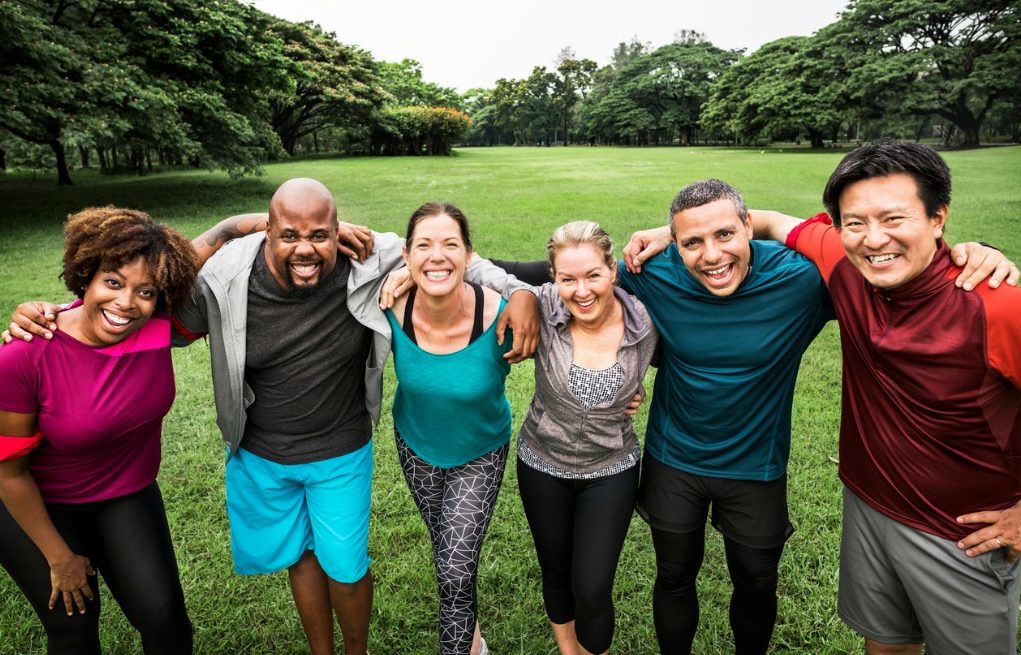Being healthy requires more than access to healthcare. Numerous aspects of where we live, work and go to school – often called the social determinants of health – impact our overall well-being. For Minority Health Month, TFAH is sharing the following information on what communities can do to reverse the inequities that often lead to poorer health outcomes in minority communities.
 |
Racial Healing and Achieving Health Equity in the United States: This 2018 issue brief highlights and acknowledges health inequities, the factors that influences them and highlights policy recommendations that can help the nation achieve health equity. TFAH issued the brief in conjunction with The Truth, Racial Healing & Transformation’s second annual National Day of Racial Healing, which is intended to identify key steps toward collective action to promote positive and lasting change across issues. |
| Advancing Health Equity: What We Have Learned from Community-based Health Equity Initiatives: This convening identified and examined promising practices and outlines core strategies of successful community-based health equity initiatives and recommendations for next steps in creating and advancing a policy agenda to promote community-based health equity. | |
| Taking Action to Promote Health Equity – Using the Lessons from Cutting-Edge Practices to Improve Health and Well Being: TFAH’s Fall 2018 4-part health equity webinar series features national public health practitioners and community leaders sharing their experiences shaping and executing programs to increase health equity in their communities. The webinar series is designed to inform a broad, national audience about compelling and replicable health equity initiatives and how to address the grass roots issues that will impact their success. | |
 |
The State of Obesity: Better Policies for a Healthier America, 2018: This report highlights the latest obesity trends, policies, programs, and practices that can reverse the obesity epidemic, and Includes key recommendations for specific actions. New studies documenting national obesity rates and trends reinforce what we already know: obesity rates are alarmingly high; sustained, meaningful reductions have not yet been achieved nationally and racial, ethnic, and geographic disparities persist. For example, Black and Latino children and adults continue to have higher obesity rates than Whites and Asians. |
| Building a Community Roadmap to Health and Equity in Jackson, Mississippi: The health indicators for the Black population of Mississippi are significantly worse than for the White population. Black residents live on average 4 years less than Whites and have more deaths from cancer, heart disease, HIV and many other chronic conditions. The Mississippi Roadmap to Health Equity, Inc., a community-based organization in Jackson, is actively engaged in improving those statistics with its focus on changing the conditions in the lives of the low-income Black population. | |
 |
Pain in the Nation Update: While Deaths from Alcohol, Drugs, and Suicide Slowed Slightly in 2017, Rates Are Still at Historic Highs: Deaths from synthetic opioids continue to rise sharply and suicides are growing at the fastest pace in years. More than 150,000 Americans died from alcohol- and drug-induced causes and suicide in 2017—more than twice as many as in 1999—according to a new analysis by Trust TFAH and Well Being Trust (WBT) of mortality data from the U.S. Centers for Disease Control and Prevention. In 2017, synthetic-opioid deaths were highest among males, Blacks, Whites, adults ages 18–54, and those living in urban areas. Additionally, over the past decade, suicide increased in nearly every state. However, there were substantial variations by demographics —with larger proportional increases among younger people and racial and ethnic minorities. |
 |
Promoting Health and Cost Control: How States Can Improve Community Health and Well-Being Through Policy Change: Prevention starts with people leading a healthy lifestyle. Yet certain populations, including racial and ethnic minorities have worse health outcomes than other groups. These inequities in health can often be attributed to differences in living conditions, exposure to traumatic events, and the lack of access to needed resources in their community, which in many cases are a result of discriminatory policies and practices. There are several evidence-based policies that can be implemented to address these hurdles and close health disparities. TFAH’s new report, Promoting Health and Cost Control: How States Can Improve Community Health and Well-being Through Policy Change highlights 13 policies, all outside the healthcare sector, that if adopted by states can improve the health and well-being of their residents. |
 |
Ready or Not: Protecting the Public’s Health from Diseases, Disasters and Bioterrorism, 2019: Ready or Not provides an annual snapshot of states’ public health and emergency response preparedness. Many communities of color can suffer disproportionately during a disaster due to unequal access to services before and after an event. Community resilience and preparedness planning must recognize health inequities, address systemic barriers to services and ensure inclusive planning, especially for populations that may face a disproportionate impact of disasters. |




